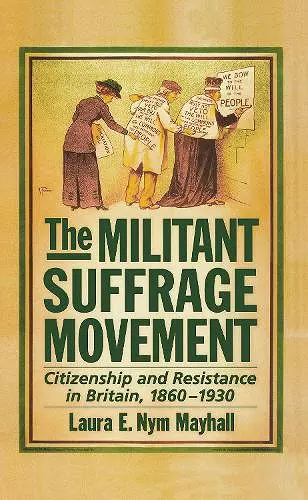The Militant Suffrage Movement
Citizenship and Resistance in Britain, 1860-1930
Format:Paperback
Publisher:Oxford University Press Inc
Published:17th Jul '20
Should be back in stock very soon
This paperback is available in another edition too:
- Hardback£112.50(9780195159936)

The image of middle-class women chaining themselves to the rails of 10 Downing Street, smashing windows of public buildings, and going on hunger strikes in the cause of "votes for women" have become visually synonymous with the British suffragette movement over the past century. Their story has become a defining moment in feminist history, in effect separating women's fight for voting rights from contemporary issues in British political history and disconnecting their militancy from other forms of political activism in Britain in the 19th and early 20th centuries. Drawing upon private papers, pamphlets, newspapers, and the records of a range of suffrage and political organizations, Laura E. Nym Mayhall examines militancy as both a political idea and a set of practices that suffragettes employed to challenge their exclusion from the political nation. She traces the development of the suffragettes' concept of resistance from its origins within radical liberal discourse in the 1860s, to its emergence as political practice during Britain's involvement in the South African War, its reliance on dramatic spectacle by suffragette organizations, and its memorialization following enfranchisement. She reads closely the language and tactics militants used, analyzing their challenges in the courtroom, on the street, and through legislation as reasoned actions of female citizens. The differences in strategy among militants are highlighted, not just in the use of violence, but also in their acceptance and rejection of the authority of the law and their definitions of the ideal relationship between individuals and the state. Variations in the nature of protest continued even during World War I, when most suffragettes suspended their activities to serve the nation's war effort, while others joined peace movements, opposed the state's reduction of civil liberties in wartime, and continued the struggle for suffrage. Mayhall's revealing account of the militant suffrage movement sheds new light upon the social history of gender but, more importantly, it connects this movement to the political and intellectual history of Britain. Not only did militancy play an essential role in the achievement of women's political rights but it also contributed to the practice of engaged citizenship and the growth of liberal democracy.
In this splendid book, Laure Nym Mayhall redefines suffrage militancy and explores it perceptively as a complex and sophisticated political idea involving a wide range of organizations, strategies, and practices. A singular achievement. Mayhall has done the history of women in Britain and the wider history of British political culture a great service. * History: Review of New Books *
Laura Nym Mayhall's account is one of a number of feminist reassessments of the militant suffrage campaign, and one that seeks to reclaim militancy as a serious political tactic against the onslaughts of less sympathetic writers who have dismissed it as a manifestation of female hysteria. Nym Mayhall's work reminds us of the diversity of militancy as well as its political dimensions and is a welcome contribution to the broader feminist project of reclaiming the WSPU as a political body. * Journal of Modern History *
Just when it seemed that this field had exhausted itself in terms of both evidence and paradigms, Mayhall's book recaptures suffrage history not just for politics, but for Victorian and Edwardian history broadly conceived. * Antoinette Burton, University of Illinois at Urbana-Champaign *
Here is a stimulating book which explores the lineage of the militant suffrage movement, crucially integrating it into the wider development of modern British political culture. From the very first page we are encouraged to interrogate and so reconfigure the contours and meanings of suffrage militancy. * Angela V. John, University of Greenwich *
Historians of women and gender are radically transforming how we think about the complex ways in which claims to citizenship can be raised and nowhere more clearly than in studies of the early twentieth-century struggles over the franchise. Laura Mayhall's splendid book brings largeness of vision, impressive breadth, and precision to this task. It challenges British historians to pay attention. * Geoff Eley, University of Michigan *
Mayhall's work offers fresh and stimulating insights into this often puzzling phenomenon. She has a special ability to see beyond the frenzy of demonstrations and deputations and to recognize the historical process of 'fetishization' that has conflated militancy with violence. With this thoughtful study, Mayhall has moved suffrage militancy permanently off the shelf of odd curiosities. * Jacqueline R. deVries, Augsburg College *
In bringing to light the dynamism and range of practices of constitutional suffrage militancy before and during the Great War and its differences of opinion on fundamental questions, in illuminating the relationship suffragettes asserted between resistance and citizenship, and in contextualizing the militant suffrage movement within the British radical political and intellectual tradition, Mayhall has done the history of women in Britain and the wider history of British political culture a great service. * Albion *
Laura Mayhall's important work provides a quite new understanding of the phenomenon of militancy * one that will fundamentally change how the history of British feminism is understood.Barbara Caine, author of English Feminism, 1780-1980 *
ISBN: 9780197531037
Dimensions: 155mm x 231mm x 15mm
Weight: 386g
240 pages